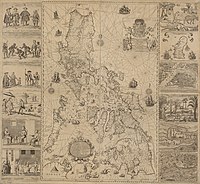
Photo from wikipedia
122 appointed ambassador to the United Kingdom (UK), which was considered a penalty and not a promotion for Guerrero. Fernandez could have provided background information on the Recto decade in… Click to show full abstract
122 appointed ambassador to the United Kingdom (UK), which was considered a penalty and not a promotion for Guerrero. Fernandez could have provided background information on the Recto decade in Philippine foreign policy, a narrative that would have placed Guerrero in the same pantheon as Laurel and in clear contrast to Magsaysay. Instead of criticizing Vice President Carlos P. Garcia’s ambivalence (Garcia was acting Secretary of Foreign Affairs to Magsaysay), the author could have shown the entire picture of Philippine diplomacy during the Cold War: the “conservatives” of the pro-American side (Magsaysay and Carlos P. Romulo) and the “progressive-neutralist” side (Recto, Laurel, and Guerrero). Guerrero’s speeches as ambassador to the UK, Spain, India, Mexico, Cuba, and Yugoslavia and as a member of the Philippine delegation to the UN showed his allegiance to Recto’s progressive-neutralist side. Recto was known for his advocacy for the reexamination of Philippines–US relations, closer Asian ties, and the adoption of a neutralist foreign policy during the Cold War. Despite the identified shortcomings, Fernandez succeeds in some ways in situating Guerrero’s story in the intersections of family, literary, diplomatic, and transnational history of the postwar Philippines. Fernandez gives us a glimpse of how Guerrero’s nationalist and realist approach might have contributed to the Philippines’s quest for identity in the community of nations. Through a meticulous analysis of the diplomat-scholar’s speeches and dispatches, Fernandez secures Guerrero’s place in Philippine diplomatic history.
Journal Title: Philippine Studies: Historical and Ethnographic Viewpoints
Year Published: 2018
Link to full text (if available)
Share on Social Media: Sign Up to like & get
recommendations!